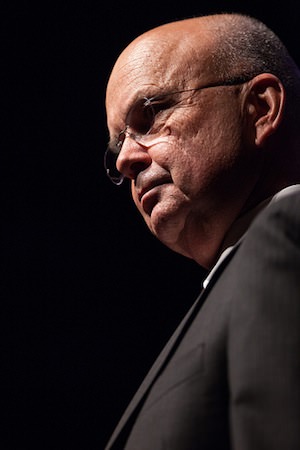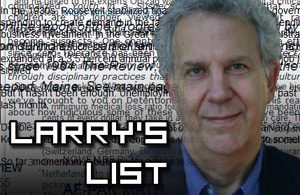Michael Hayden: Terrorists Love Gmail
While defending the legal basis for the NSA's mass domestic data mining program, the former NSA and CIA director claimed Sunday that "Gmail is the preferred Internet service provider of terrorists worldwide," adding: "I don't think you're going to see that in a Google commercial, but it's free, it's ubiquitous, so of course it is."
While defending the legal basis for the NSA’s mass domestic data mining program, former NSA and CIA director Michael Hayden claimed Sunday that “Gmail is the preferred Internet service provider of terrorists worldwide,”adding: “I don’t think you’re going to see that in a Google commercial, but it’s free, it’s ubiquitous, so of course it is.”
Hayden’s speech on “the tension between security and liberty” was part of an adult education forum at St. John’s Episcopal Church in Washington D.C.
Asked whether the United States’ spying activities was setting a dangerous example for other nations, Hayden suggested that the American origins of the Internet justifies the NSA’s conduct. If the Web lasts another five centuries, he said, future generations may remember it “the way the Romans are remembered for their roads.”
“We built it here, and it was quintessentially American,” he said, adding that partially due to that, much of traffic goes through American servers where the government “takes a picture of it for intelligence purposes.”
— Posted by Alexander Reed Kelly.
Your support matters…Andrea Peterson at The Washington Post:
Hayden also conceded that the United States. “could be fairly charged with the militarization of the World Wide Web.” The NSA’s Tactical Access Operations (TAO) is reportedly charged with hacking foreign targets to steal data and monitor communications. It also reportedly develops programs that could destroy or damage foreign computers and networks using cyberattacks.
At one point, Hayden expressed a distaste for online anonymity, saying “The problem I have with the Internet is that it’s anonymous.” But he noted, there is a struggle over that issue even inside government. The issue came to a head during the Arab Spring movement when the State Department was funding technology to protect the anonymity of activists so governments could not track down or repress their voices.
“We have a very difficult time with this,” Hayden said. He then asked, “is our vision of the World Wide Web the global digital commons — at this point you should see butterflies flying here and soft background meadow-like music — or a global free fire zone?” Given that Hayden also compared the Internet to the wild west and Somalia, Hayden clearly leans toward the “global free fire zone” vision of the Internet.
Independent journalism is under threat and overshadowed by heavily funded mainstream media.
You can help level the playing field. Become a member.
Your tax-deductible contribution keeps us digging beneath the headlines to give you thought-provoking, investigative reporting and analysis that unearths what's really happening- without compromise.
Give today to support our courageous, independent journalists.






You need to be a supporter to comment.
There are currently no responses to this article.
Be the first to respond.